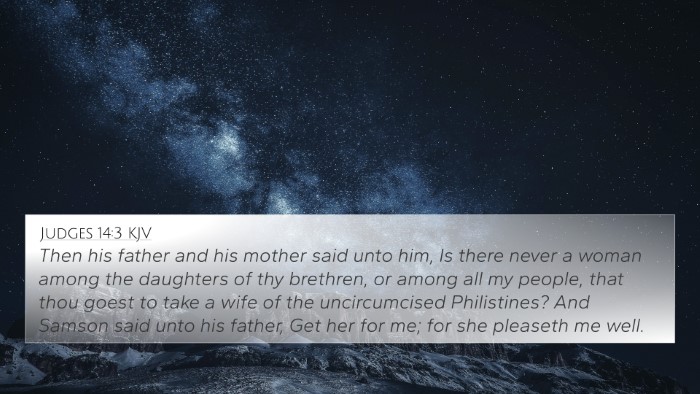Understanding Exodus 21:8
Exodus 21:8 states: "If she does not please her master, who has betrothed her to himself, then he shall let her be redeemed; he shall have no right to sell her to a foreign people, since he has dealt deceitfully with her."
Overview of the Verse
This verse is part of a larger section in Exodus that outlines the laws concerning servitude and marriage in ancient Israel. Specifically, it addresses the treatment of a female servant who has been promised to her master as a wife. The verse emphasizes the rights and protections afforded to women in such situations, underscoring the moral obligations of the master.
Thematic Insights
Fairness in Servitude: The verse highlights God's concern for justice and equity in societal relationships. Matthew Henry comments that the implications of this law demonstrate God’s desire for humane treatment, implying that exploitation will not be tolerated.
Marital Obligations: Albert Barnes notes that this verse also indicates the seriousness of marriage commitments in the Hebrew culture. It suggests that the master's responsibilities extend beyond simple ownership and into a covenantal obligation.
Commentary Insights
- Matthew Henry emphasizes the importance of allowing redemption, indicating that the servant’s dignity must be preserved. He also contrasts the practices of surrounding nations that may not offer such rights.
- Albert Barnes elaborates on the deceitful treatment a woman could suffer, thereby addressing a broader theme of justice and the protection of the vulnerable within society.
- Adam Clarke draws attention to ancient practices and contextualizes the verse within the cultural practices of the time, highlighting the unique stance of the Israelites compared to their neighboring cultures.
Connections with Other Bible Verses
Exodus 21:8 resonates with numerous other scriptures and themes, revealing an intertextual dialogue throughout the Bible. Below are 7-10 related Bible verses that further illuminate its meaning:
- Deuteronomy 15:12-15 - Offers guidelines on the release of servants, reinforcing the themes of redemption and humane treatment.
- 1 Timothy 6:1-2 - Discusses the conduct of servants and their masters, promoting mutual respect and responsibility.
- Matthew 7:12 - The principle of treating others as one wants to be treated resonates with the justice demanded in Exodus 21:8.
- Galatians 3:28 - Illustrates the value of individuals in God's eyes, connecting to the protective demeanor encouraged in Exodus.
- Leviticus 25:39-40 - Addresses the treatment of fellow Israelites in servitude, highlighting the continuity of ethical treatment across different texts.
- Proverbs 22:22-23 - Advises against taking advantage of the poor and vulnerable, aligning with the protective measures outlined in Exodus 21:8.
- Luke 4:18 - Jesus reads from Isaiah, declaring his mission to proclaim freedom for the oppressed, echoing the redemptive theme found in Exodus.
- Colossians 4:1 - Paul calls for fairness between masters and servants, paralleling the moral duty described in Exodus 21:8.
- Malachi 2:16 - Speaks to God’s disdain for mistreatment in marriage, reinforcing the sanctity and seriousness of such commitments.
Cross-Referencing Insights
Cross-referencing these Biblical texts can enhance our understanding of complex themes such as justice, redemption, and the treatment of others. The art of cross-referencing Biblical texts allows us to unveil deeper meanings and cohesive narratives throughout scripture.
Tools for Bible Cross-Referencing
Utilizing tools like a Bible concordance or a cross-reference Bible study guide can significantly aid in identifying the intricate connections between Bible verses. These resources offer examples of how various scriptures relate, allowing for a comparative Bible verse analysis that enriches personal study and sermon preparation.
Conclusion
Exodus 21:8 serves as a powerful reminder of God's concern for justice and the ethical treatment of individuals within society. By connecting this verse with others through thematic Bible verse connections and utilizing cross-referencing methodologies, readers can gain a profound understanding of scriptural principles that are relevant across time.












